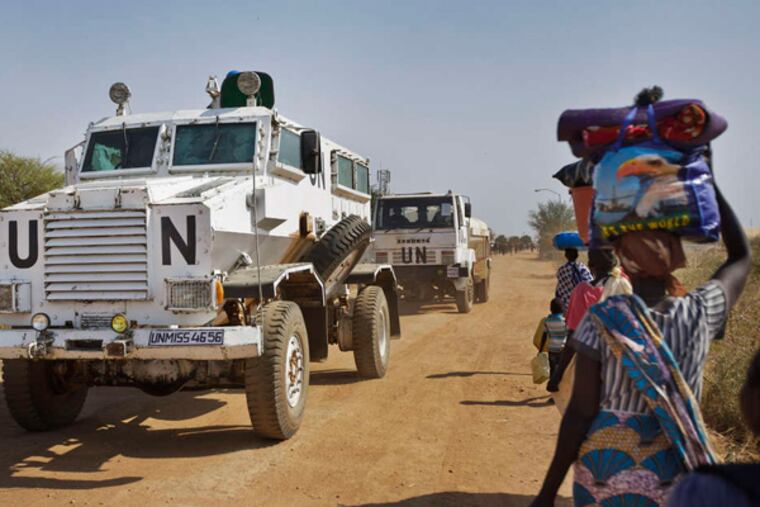Uganda warns S. Sudan rebel leader
JUBA, South Sudan - Uganda's president on Monday warned South Sudan's rebel leader against rejecting the government's offer of a cease-fire, saying regional leaders would unite to "defeat" the former vice president who is accused of mounting a failed coup in the world's newest country.

JUBA, South Sudan - Uganda's president on Monday warned South Sudan's rebel leader against rejecting the government's offer of a cease-fire, saying regional leaders would unite to "defeat" the former vice president who is accused of mounting a failed coup in the world's newest country.
Ugandan President Yoweri Museveni told reporters in Juba, the South Sudan capital, that a regional bloc known as IGAD had given Riek Machar "four days to respond" to the cease-fire offer. If he doesn't we shall have to go for him, all of us," he said, referring to IGAD.
A meeting of East African leaders last week said it "welcomed the commitment" by South Sudan's government to cease hostilities against rebels and urged both sides to start peace talks by Tuesday. Machar instead called for a negotiated cease-fire that includes a way to monitor compliance.
The U.N. Security Council on Monday evening issued a statement reiterating its support for IGAD's "efforts to bring about peace" and insisted that the warring factions begin talks "without preconditions."
Violence since mid-December in South Sudan has displaced up to 180,000 people, the U.N. said Monday.
Uganda's influence is strong in South Sudan, where special forces from the neighboring country have been deployed at the request of South Sudan's President Salva Kiir, raising questions about the impartiality of Uganda as a possible mediator in a conflict that many fear could lead to civil war in the world's newest country.
But France's ambassador to the United Nations said South Sudan's government has the right under international law to seek help from neighboring countries to defend itself.
"There is a government in South Sudan, which has the right to ask for another country to support its military efforts," said Gerard Araud, who is the U.N. Security Council president. He added that the Security Council "does not have a say" in whether South Sudan seeks such help.
Museveni and Kiir are strong allies. The Ugandan leader is believed to be concerned about the security implications for Uganda of a violent takeover of South Sudan's government.
For years the brutal warlord Joseph Kony, who once operated in the expansive jungle that now falls within South Sudan's territory, was a source of tension between Uganda and Sudan. Sudan's government faced persistent allegations of supporting Kony's rebellion against Uganda's government. Kony was forced to flee, and is thought to have fled to Congo and then Central African Republic, as the south moved closer to independence from Sudan.
South Sudan peacefully broke away from Sudan in 2011 after a decades-long fight for independence, giving Uganda a new sense of border security. Uganda, one of the South's strongest supporters in its quest for independence, denies it has taken sides in South Sudan's latest conflict, saying its forces provided security as Western countries and others safely evacuated their citizens from South Sudan.